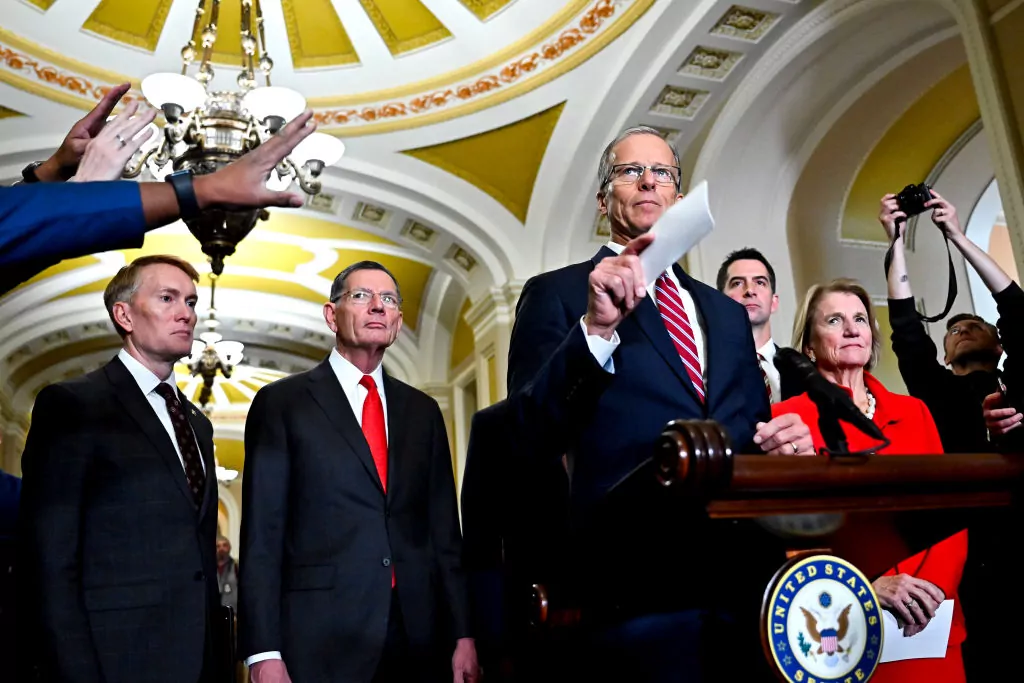Senate Rejects Bid to Overturn Trump's 'Liberation Day' Tariffs

The Senate turned down a proposal Wednesday intended to annul President Donald Trump is an international tariff emergency, a legislative victory for the White House following a comparable measure that was approved four weeks prior.
The bill aimed at terminating the national emergency declared by Trump to implement his temporarily halted "Freedom Day" tariffs fell short with a tied vote of 49-49, even though three Republican senators sided with all Democrats.
The voting took place just hours later. new data indicated that the GDP had contracted for the first time in three years, exacerbating Republicans' concerns about the unstable economy. However, with Senator Mitch McConnell (R-KY), a critic of tariffs, absent along with Democrat Sheldon Whitehouse (D-RI), this prevented the vote from turning into an embarrassing mark against the administration’s record.
Although Republicans are somewhat uncomfortable with the situation, they have mostly permitted Trump to employ tariffs as negotiating tactics during trade discussions. Nevertheless, Senators Ron Wyden (D-OR) and Rand Paul (R-KY), who together introduced the resolution , demanded a vote.
During his address on the Senate floor, Wyden charged Trump with harming the economy and diminishing America’s position through tariffs that the White House temporarily halted for 90 days due to a stock market downturn.
"Trump has undermined America's credibility. Not only has he made it improbable for his administration to secure favorable terms for American workers, but he has also impaired the ability of every subsequent president aiming to negotiate beneficial trade agreements," stated Wyden.
The White House asserts that any financial discomfort is short-term, whereas Trump on Wednesday pointed fingers at ex-President Joe Biden for the current economic situation.
Given that the resolution is deemed privileged, Senate Republican leadership couldn’t prevent it through procedural means, leading to efforts aimed at reducing desertions since they could only spare losing up to three of their members in the voting process.
Senator Susan Collins from Maine, who supported the proposal, stated to journalists on Wednesday that she believes the resolution contains some shortcomings and might be too broad. However, she also mentioned that it successfully communicates her view that the United States needs to be more cautious when imposing tariffs.
It may not be perfect; I believe it’s quite broad," Collins stated before the vote. "However, it conveys the message I intend to convey—that we must be much more selective when enforcing these tariffs and avoid treating allies such as Canada in the same manner as our adversaries.
The other two defectors were Paul and Senator Lisa Murkowski from Alaska.
The resolution was not expected to be taken up in the House, where Speaker Mike Johnson (R-LA) passed language blocking Democratic efforts to curb Trump’s tariff powers. Still, the Senate vote served as a litmus test of GOP patience with the tariff policy.
The White House had threatened to veto The decision made earlier this week, indicating it could compromise both economic stability and national security.
The veto threat follows the action taken by the Senate. voted Earlier this month, they aimed to rescind Trump's narrower emergency proclamation concerning tariffs on Canada. Four Republican Senators backed the previous attempt: Paul, Collins, Murkowski, and McConnell.
The U.S. economy shrank By 0.3% in the initial quarter of 2025, signaling its first downturn in three years, according to the Commerce Department’s statement on Wednesday. This decrease occurred as businesses hastened to make imports before impending tariff increases, leading to a spike in supplies.
Senator Thom Tillis from North Carolina refrained from voting for the tariff repeal, having earlier criticized it as a partisan "shirt-skin game." However, indications of growing discomfort with President Trump’s approach to tariffs are beginning to emerge among his fellow Republicans.
The electorate is primarily guided by the query: Are you more prosperous now compared to how things were – insert timeframe here – years back? Clearly, should such turbulence persist until next year, it poses a significant hurdle for the Republican Party," stated Tillis during an interview with journalists on Wednesday evening. "One cannot view this situation today without acknowledging its utter unsatisfactoriness.
Several Republicans still maintain that the recent economic figures indicate persistent struggles for employees instead of reflecting Trump’s actions.
“I don’t believe this figure reflects poorly on the present president alone. After all, these economic conditions were passed along to him; however, it highlights how working individuals haven’t seen an increase in earnings for quite some time now—they’re actually moving backward,” stated Senator Josh Hawley (R-MO). “For instance, look at rising gasoline and food costs alongside declining salaries. It’s crucial we reverse this trend.”
Senator Tommy Tuberville from Alabama supported Trump's approach to tariffs, arguing that these measures are essential for rejuvenating domestic manufacturing. He acknowledged potential temporary fluctuations but emphasized that this would eventually lead to gains for both American workers and businesses.
President Trump is making the correct decision," Tuberville stated on Wednesday evening. "These tariffs are proving effective. They benefit American businesses, and ultimately, we must take steps to support the American populace and bring manufacturing back to our country. There may be challenges ahead, yet positive outcomes lie in store for us.
RAND PAUL RESURRECTS REPUBLICAN TRADE DISPUTE WITH LIBERATION DAY VOTE ' TARIFFS
Senator Peter Welch from Vermont denounced the tariffs as both detrimental and futile, asserting that even though Republicans may be resistant, public pressure will ultimately compel legislators to take action.
These tariffs are catastrophic," Welch stated on Wednesday evening. "They have absolutely no beneficial effect whatsoever, and numerous of my GOP counterparts are hesitant due to Trump’s influence.” However, he added, “Eventually, these representatives will heed the voice of their constituents, who desire an end to such tariffs.
Officials from the Trump administration have recently claimed that trade discussions with countries affected by tariffs are progressing positively, though they haven’t provided many details.
David Sivak helped with this report.
Post a Comment for "Senate Rejects Bid to Overturn Trump's 'Liberation Day' Tariffs"